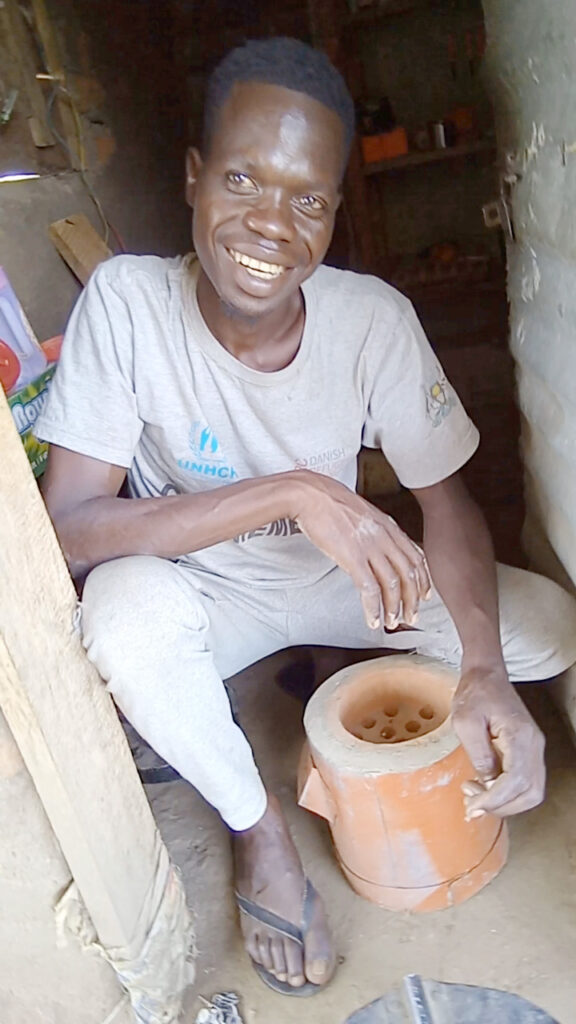Leaving No One Behind: The Triumph of an Environmental-Oriented Skill Development Campaign in West Nile
Charles Khemis, 31, a proud father of three had previously not been involved in any income-generating activity and was was struggling to feed his children. Khemis’ frustration was understandable because he would have loved to do more for his family, but unfortunately, he was not a man of unlimited skills.
Khemis’ circumstances of being a resident of Imvepi Refugee Settlement in Terego district, West Nile, did not help matters. Established in 2017 in response to the large influx of refugees fleeing the civil war and violence in South Sudan, Imvepi like many other refugee settlements, faces challenges ranging from overcrowding to limited resources, and largely the monster of providing its residents with opportunities to earn a living. This was the similar case with Khemis.

“Supporting three school-going children without being involved in any income-generating activity was difficult. Since I did not have any particular skill in any field, I just used to till neighbor’s gardens for a small fee and the little money I would earn would just be for meeting simple basic needs,” Khemis said.
Khemis, however, adds that this precarious situation changed the day Luigi Giussani Foundation (LGF) registered him and his colleagues for a green skilling training. He now says he knows how to make energy-saving stoves and carrying out solar power installations. “Learning to make make energy saving stoves has changed my life. I sell each stove at sh25,000. Before, I used to spend the little money I earned to buy charcoal in town. My wife also used to go deep into the bushes to gather firewood. She doesn’t have to do that anymore, a seemingly excited Khemis added.
For context, LGF in partnership with Oxfam, is implementing a four-year project: Humanitarian Development and Peace Initiative for Crisis Affected Population in Uganda with funding from the Danish International Development Agency (DANIDA).

The, project also known as DANIDA SP II, is being implemented in three refugee host districts of Yumbe, Madi-Okollo, and Terego in refugee settlements of Rhino Camp, Bidi Bidi, and Imvepi. The project intends to build on the capacity of the refugee and host
communities to become more resilient, peaceful, and self-reliant through the project change objectives namely; Just Societies; Leaving No One Behind; and Climate Justice. All the four objectives are aligned to respond to fragile contexts, displacement, climate change, and green solutions.
In the project, LGF is taking the lead in the implementation of education related interventions; ranging from designing and adaptation of manuals for green skills (tree planning, briquettes, energy saving stoves), adaptation of TEDP manuals and capacity building of instructors from selected VTIs, among others. A total of 500 youth have so far been enlisted in the project for training on eco-friendly practices such as production of energy-saving stoves, briquette making, and solar installation. Of the total, 300 out-of-school youth were enrolled from the refugee settlement and the host communities, and 200 in-school youth from the vocational training institutes of Omugo
Technical School, Inde Technical School, and Lodonga Polytechnic School. Khemis and many others are part of this group of youth that are now putting their newly acquired knowledge of environmentally friendly practices to improve their livelihoods.
Christine Waleya
Christine Waleya is from Tikka zone, Rhino Camp in Terego and Madi-Okollo districts. From childhood, Waleya says, she always found the idea of putting wires together to make light fascinating She says that as a result, she perceived her participation in the green skilling training as a fulfilment of a dream.
“From childhood, I always wanted to bring light to people. So, when I heard about the solar installation training, I was so excited to join. The training went on well. It was near to my community and easily accessible. The training schedule was also good for me, and the facilitators ensured no one was left behind,” she says.
Waleya finally can light up rooms; not only by carrying out solar installations but also by sharing the knowledge she acquired from the training with others.
“Now we have light in our room at night. Our children can also read books at night which has improved their school performance. However, I am not keeping this knowledge to myself, I share with others. I am so happy for the training and I am looking forward to any further possibility to learn more. I am grateful to LGF for the opportunity and hope this is not the end,” Waleya adds.
Joice Alomo
Joice Alomo, 19, and a mother of one is also from Zone 3 in Imvepi Refugee Settlement. Alomo says they were approached and assessed by an LGF community mobiliser and then enrolled for the training.
“During the training, they divided us into smaller groups and trained us on how to make energy-saving stoves and how to carry out solar connections. I picked interest in solar installations. After the training, I saved some money and bought my own solar battery. I now charge phones for a fee and the money I make from that has changed my life,” Alomo says.
Cicilia Gire
Cicilia Gire is from Zone 4 Bidibidi Settlement. Gire says they were approached by an LGF mobiliser to join and that she also convinced a friend to grab the opportunity and learn something.
“Among the two; making energy stoves and briquettes, I chose briquettes because they are simple to make it. It was a hands-on training and so I am now able to make briquettes and sell them. I use the money to meet other basic needs like buying soap and meat,” she says.
These and so many other stories are part of remarkable journey of skilling and empowerment that many can be proud of. Through dedicated training programs, individuals who had once known displacement and uncertainty have now carved a path to self-reliance. From acquiring vocational skills to self-sustainability, these success stories stand as a testament to the transformative power of education.



